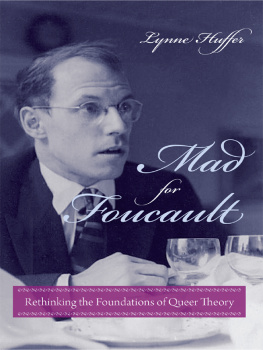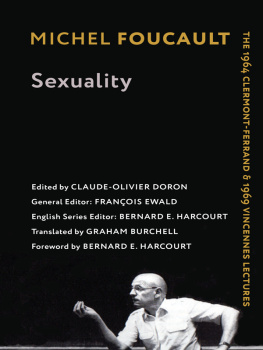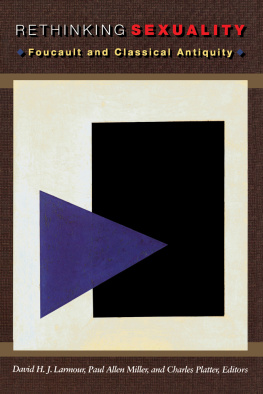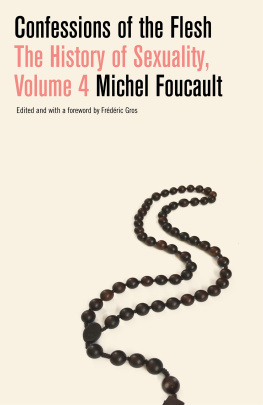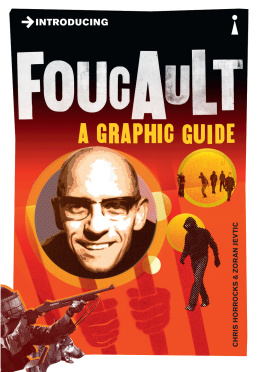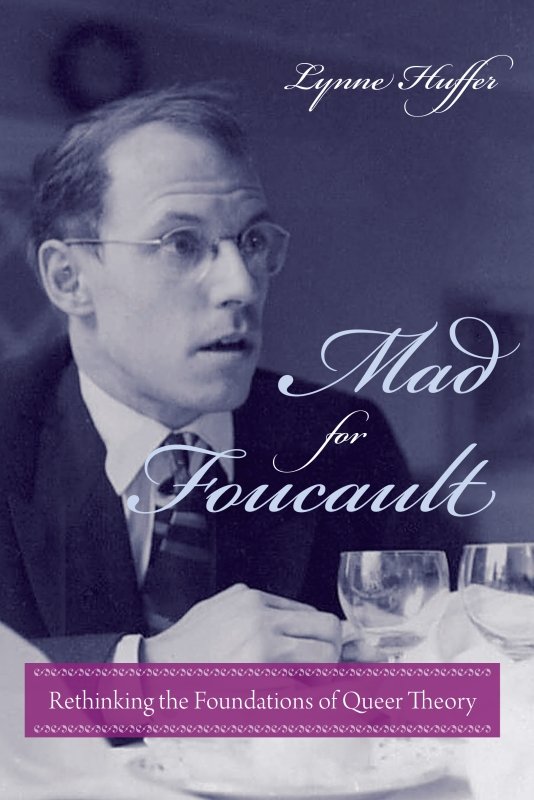
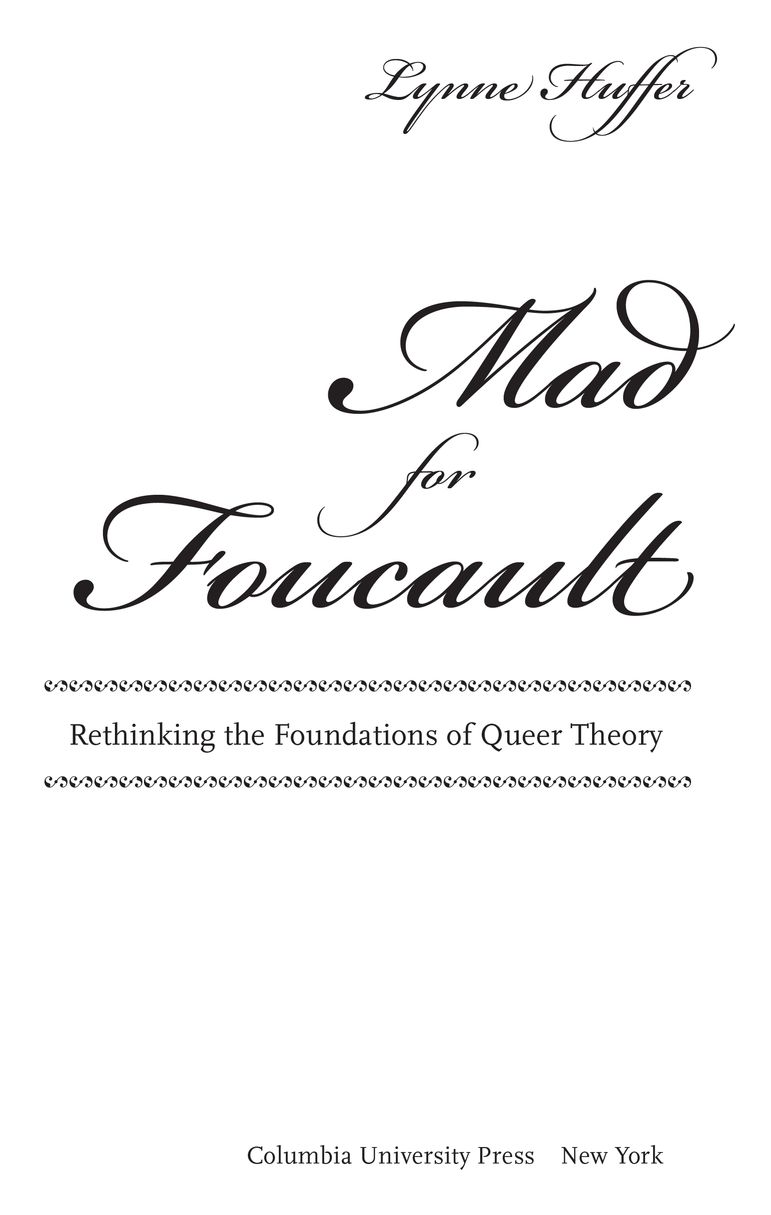
Table of Contents
GENDER AND CULTURE
For Tamara
Preface
WHY WE NEED MADNESS
To shake off philosophy necessarily implies a... casual abandon.... Its to counter [philosophy] with a kind of surprised and joyful foolishness, a sort of incomprehensive burst of laughter which, in the end, comprehends or, in any case, breaks. Yes... it breaks more than it comprehends.
Michel Foucault, 1975
The flashes and sparklings, the statements that tore themselves away from words, even
Foucaults laughter was a statement.
Gilles Deleuze, 1990
This intensive way of reading, in contact with whats outside the book, as a flow meeting other flows, one machine among others, as a series of experiments for each reader in the midst of events that have nothing to do with books, as tearing the book into pieces, getting it to interact with other things, absolutely anything... is reading with love.
Gilles Deleuze, 1973
This book is a story about reading Michel Foucault, with love. When I started this project, I had been studying and teaching Foucault for a number of years, but had never committed myself to writing about him. This half-hearted commitment was due, in part, to my intense ambivalence about his work. Like many feminists, I admired Foucaults brilliance, but felt uneasy about his seeming indifference to feminist concerns. Then, in September 2006, I spent a month in the Foucault archives in Normandy. That experience of what Deleuze calls a contact with whats outside the book not only shifted much of what I thought I knew about Foucault but also transformed my hot-and-cold feelings. Suddenly I burned with passion. My archival encounter was nothing less than an experience of rupture: I was, like Deleuzes book, torn to pieces. Returning home to Atlanta, I gathered the pieces and found the shape of a different Foucault, a different feminism, and a different queer theory than what I had known.
Finding a different Foucault outside the book brought me, paradoxically, back to a book: Foucaults first major work,
Rediscovering Madness now, almost two decades after the emergence of queer theory, I insist on Madnesss importance for our present, post-queer age. This is not to erect Madness as a monument to Foucault, but rather to bear witness to its capacity to move us. Both the archival material and History of Madness tell a story of transformation grounded in a specifically Foucauldian eros. This singular, life-affirming eros offers us resources for an ethics of living in the biopolitical world of the twenty-first century.
My own singularly strange, intensive encounter with Madness is strikingly similar to what Foucault describes as the explosive contact that occurs between a book and a reader. In his marvelous, self-ironizing preface to the 1972 French revised edition of Madness, Foucault describes his book as an object-event. The voice of the preface is a humble one: The event is minuscule, almost imperceptible among so many others, an object that fits into the hand (M xxxvii). As humble object, the book must take care to avoid speaking with the weight or solemnity of a text. Rather, it should have the dsinvolturethe lightness, the attitude of disengagement or abandonto present itself as discourse, releasing itself from literary and philosophical traditions alike. Rejecting the belles lettres book as textthe already coded, received, and ordered canonical tradition of books solidly implanted in libraries, fields of criticism, and pedagogical systemsFoucault chooses instead the book as discoursethe object-event that, like a weapon, ruptures tradition with the force of an opening in history.
Paradoxically, it is precisely in its lightnessin its refusal to be weighed down by a tradition of explications de texte, which would confer on it some official statusthat the book as discourse and as object-event carries the explosive force of a dramatic, even violent unsettling. It functions, Foucault writes, as both battle and weapon, strategy and shock, struggle and trophy or wound, conjuncture and vestige, strange meeting and repeatable scene (Mxxxviii). For Foucault, the book is a confluence of forcescauses and effects, contexts and consequences, acts and their traces, the sharp thrust of the present and the percussive repetitions of a past remembered. It is also, ultimately, a small explosion, one of many object-events destined to disappear: I think of my books as mines, explosives.... The book should disappear by its own effect. If the book has a voice, it is only the repeated one that, with true humility, performs again the works disappearance in the Nietzschean cry of the mad philosopher: I am dynamite.
There is much to be unpacked in this constellation that brings together book as object-event, discourse, repetition, and explosive disappearance. In the pages of this book, I will unpack these concepts and use them to guide my thinking on Foucault, queer theory, and the ethics of sex. Taking seriously the status of Foucaults writings as object-events, I focus primarily on Madness as one of the great unread texts of queer theory. My major aim is to read Madness, retrospectively, in light of its absence from the only academic field that takes as its primary focus the study of sexuality. I read this absence against the backdrop of the more widely read Foucauldian works that ground queer theory, especially Sexuality One. I also include in my considerations the last two published volumes of History of Sexuality, The Use of Pleasure and The Care of the Selfboth published in French in 1984as well as some of the published and unpublished materials that have come to light in the years since Foucaults death in 1984, including interviews, public lectures, radio debates, roundtables, political pamphlets, and transcriptions of his courses at the Collge de France. In engaging Madness and these other more peripheral writings and interviews, I hope to productively unravel some of the blind spots and dogmas of contemporary queer theory.
Foucaults description of the book as an object-event serves to situate my reading of him within a larger conceptualization of historical writing that Foucault called eventialization (vnementialisation). For Foucault, the concept of the event crystallized history as discontinuity and rupture, rather than as a progressive narrative based on the logic of cause and effect. In his reflections on Madness, Foucaults teacher, Georges Canguilhem, reminds us that Foucault defined eventialization as the bringing to light of ruptures of evidence. This notion of eventialization as an approach to writing history reinforces the text-discourse distinction mentioned above, where the traditional view of human history as a seamless past waiting to be read functions like the falsely solidified text of the belles lettres tradition. Eventializationthe disruptive bringing to light of that which is plain or clear to sight or understandingfunctions, like discourse, as the illuminating but fragmenting force through which the discontinuous multiplicity of history becomes an object of sight and, paradoxically, in that moment of visibility disappears from view. In this sense, the book as object-event takes its place within a larger conceptualization of history as eventialization.
Next page

